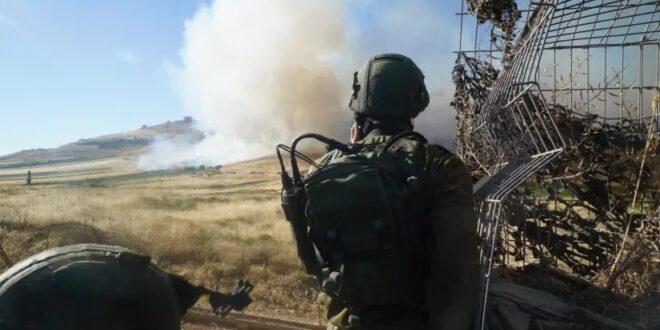411th Battalion Commander Lt.-Col. Raz Haimlich said that it “can go either way.”
With the Lebanese economy in a free fall, the IDF is concerned there may be an increase of drug smuggling and infiltrations of migrant workers or refugees along the northern border.
“The Lebanese economy is not good, and that can lead to things happening on the border,” Lt.-Col. Raz Haimlich, commander of the Artillery Corps Fire Brigade 411th “Keren” Battalion, told The Jerusalem Post. “I’m always ready for something to happen… whether it’s drugs being smuggled or people infiltrating, looking for work. I think the work that the IDF is doing will stop people from trying to smuggle.”
But “it can go either way,” he said.
Last Friday, troops under his command helped thwart an attempt to smuggle 43 pistols and ammunition from Lebanon near Ghajar, the Alawite-Arab village astride the border between Lebanon and the Israeli Golan. It was one of the largest smuggling attempts in years and was worth about NIS 2.7 million ($820,000), Haimlich said.
“It was the largest smuggling attempt, and we can see that it could be connected to the economic collapse of Lebanon,” he said.
While smuggling on the border has been going on for years, the latest attempt was worth “a lot of money,” he added.
Lebanon is currently suffering from an economic crisis that the World Bank says is one of the world’s worst financial crises since the 1850s, with violence and protests breaking out throughout the country as basic services collapse.
Some 77% of Lebanese households don’t have enough money to buy food, according to a recent assessment released by UNICEF. The country’s medicine importers have said they have run out of hundreds of essential drugs, and electricity outages and gas shortages are commonplace.
UNICEF has started giving cash handouts in US dollars to the families of some 70,000 Lebanese, Syrian and Palestinian children at risk of “child labor, early marriage or exclusion from schooling” due to the crisis, Reuters reported Wednesday.
The Lebanese Armed Force is also feeling the economic crisis, with soldiers earning only $400 to $500 a month. It is offering tourists helicopter rides for $150 in an effort to make money.
The IDF has seen a concerning connection between criminal networks and terrorism in the smuggling of drugs and weapons into Israel from southern Lebanon.
With the situation in Lebanon continuing to deteriorate, some migrant workers have tried infiltrating into Israel. In June, two Turkish men succeeded in crossing the border and were caught 11 hours later.
Haimlich’s battalion has responded to several incidents along the Lebanese border, sometimes with artillery fire, including in mid-May during Operation Guardian of the Walls, when Lebanese rioters damaged the border fence and crossed into Israel near Metulla.
Last Friday, his troops launched flares and scanned the area after suspicious movement was detected. The suspects were identified using “various means, both overt and covert,” the IDF said at the time.
The Israel Police is investigating the drug-smuggling incident. The possibility that the smuggling attempt was carried out with help of Hezbollah is also being looked into, the IDF said.
The situation in Lebanon is “complicated,” and there is no proof that Hezbollah was behind the smuggling, Haimlich said, adding that “the IDF’s intelligence is very precise and knows who is behind the attempt.”
“Hezbollah is not dumb, and because of that, we are always looking at smuggling attempts as possible terrorist attacks,” he said. “Our fight against Hezbollah is our central concern.”
In addition to stopping the smuggling of drugs and weapons, as well as thwarting infiltration attempts, “we are ready to fight and [are prepared] for terrorist attacks,” Haimlich said. “That’s what we do as an army.”
Both weapons and drugs have been smuggled into Israel from its northern border, with some of the weapons having been used in terrorist attacks.
Hezbollah receives significant financial aid from supporters who live abroad and through charities. It also relies on a wide variety of criminal activities, such as money laundering through shell companies and fraud, as well as trading in drugs, arms and “blood diamonds.”
The group also depends on a network of criminal and narcotic rings across the globe, including in Lebanon, Africa, Asia and North and South America.
At least five significant drug- and weapon-smuggling attempts have been thwarted since the beginning of the year by the IDF and the Israel Police.
In February, 12 kilograms of drugs were seized near Dovev, and one suspect was arrested in Israel. In early April, two pistols and two kilograms of drugs were seized near Metulla, and several suspects were arrested. In early June, 15 pistols, dozens of cartridges and 36 kilograms of drugs were seized, and a number of suspects were arrested. In mid-June, 12 pistols were seized near Metulla, and one suspect arrested.
Senior Hezbollah official Hajj Khalil Harb is operating a drug- and weapons-smuggling operation over the Israel-Lebanon border, the IDF said. He might be behind the smuggling attempt that was thwarted last Friday and one in the beginning of June in which 15 pistols and dozens of kilograms of cannabis worth NIS 2,000,000 were seized, it said.
 Eurasia Press & News
Eurasia Press & News




